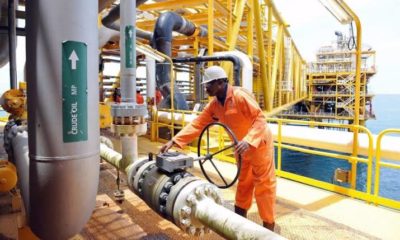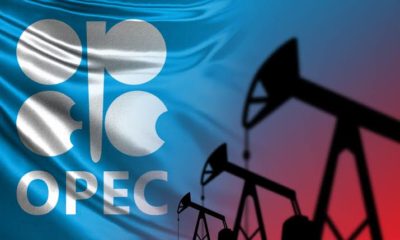Oil
Nigeria may suffer cash crunch as crude oil cargoes suffer weak demand

HOUSTON, TX-Nigeria, Africa’s Biggest Economy may be geared for tougher times as its crude oil supply schedules for January and February, 2015 seems to be currently facing an all-time low in demands.
Against the backdrop of oversupply of crude oil cargoes from both the January and February programmes, Nigerian crudes continued to fall at a steady pace due to weak demand, trading sources have said even as international crude prices continue to drop to an all time low of US$56.06.
Almost all of the key Nigerian crudes were said to be at multi-year lows, and with the picture looking even more bearish, values were expected to decline further.
The country’s flagship grade, Qua Iboe, was pegged close to Dated Brent plus $0.50/barrel on Monday afternoon. It was assessed at Dated Brent plus $0.51/b Wednesday, the lowest since April 22, 2009, Platts data showed.
Meanwhile, the consensus among many Arab OPEC producers is that, one way or another, the worldwide price of oil will stabilize then rise again during 2015, settling between $70 and $80 per barrel by the end of the year, probably without intervention from the cartel’s leadership.
“The general thinking is that prices can’t collapse, prices can touch $60 or a bit lower for some months then come back to an acceptable level which is $80 a barrel, but probably after eight months to a year,” one Gulf oil source disclosed anonymously.
However, the Nigerian market remained oversupplied with approximately 20 million barrels for January still available along with almost the entire February programme.
Traders said that as a result, crude values were expected to fall, especially with such weak buying interest from Asian and European refiners.
Asian and European demand for Nigeria and other West African cargoes has been slow so far, exacerbated by high freight rates and the availability of cheaper sweet crudes in both regions, according to Platts.
“There is a massive overhang [on WAF],” a trader was quoted by Platts as saying. “The Middle Eastern producers are encroaching on WAF buyers. They are offering eye-watering discounts. If I can buy a Murban at a $2/b discount versus Bonny Light, then Bonny Light has to come down [heavily] to compensate for the freight differentials for it just to compete. I wouldn’t be surprised if Bonny Light and Qua Iboe go to Dated Brent plus $0.30/b soon.”
Similarly, the light sweet Agbami was pegged near Dated Brent minus $0.90/b on Monday, and this grade was assessed at Dated Brent minus $0.86/b on Friday, the weakest since November 12, 2012, according to Platts data.
Traders said the January 30-31 Agbami stem had been sold by a trader at Dated Brent minus $0.90/b but details of the buyer could not be immediately confirmed. Traders said Agbami January cargoes were being offered weaker than Dated Brent minus $0.50/b and with both gasoline and naphtha cracks very weak, naphtha-rich light sweet crudes such as Akpo and Agbami were falling sharply.
“Naphtha cracks are terrible, the light [crudes] are suffering,” the trader said. “The ultra-light crudes [like Agbami] are in worse condition. The February programme for Agbami hasn’t moved at all.”
The Organisation of Petroleum Exporting Countries had in its latest monthly oil report predicted lower global oil demand for this year and 2015.
OPEC, which supplies about 40 per cent of the world’s oil, forecast that the call on the group’s crude would drop in 2015 to its lowest level in 12 years.
The projected demand for OPEC crude will be just under 29 million bpd as a result of non-OPEC supply expected to grow by 1.36 million bpd in 2015, according to the 12-member cartel.
The United states, Nigeria’s biggest Oil customer has ceased to lift a drop of oil from the West African Country in the face of increased production in the US said to have reached over 8 million barrels daily.
Oil
NNPC Targets 60% Methane Emission Reduction By 2031
The Nigerian National Petroleum Company Limited (NNPC) has unveiled a bold strategy to reduce methane emissions in the oil and gas sector by 60% by 2031, with an ultimate goal of achieving net-zero emissions by 2060.
This announcement reinforces Nigeria’s leadership role under the Global Methane Pledge initiative and its commitment to tackling climate change.
The Group Chief Executive Officer of NNPC, Mele Kyari, disclosed these plans during a meeting on Thursday with Robert Leahman, the U.S. State Department’s Global Methane Program Manager, and a delegation from Deloitte.
READ MORE: Atiku Gloats Over AUN’s Achievements Ahead Of 20th Anniversary
The discussions, held at the NNPC Towers in Abuja, focused on collaborative efforts to reduce methane emissions through innovative and sustainable practices.
“Reducing methane emissions is not just an environmental necessity but also a strategic imperative for Nigeria’s energy transition. We are leveraging partnerships to adopt global best practices and innovative solutions,” Kyari stated.
Key among these efforts is a pilot project in the Niger Delta, aimed at establishing emissions baselines, mitigating methane leaks, and promoting sustainable operations across Nigeria’s energy sector.
The project, a partnership between NNPC, Deloitte, and the U.S. Bureau of Energy Resources, will utilize data-driven methodologies to pinpoint and address methane hotspots.
Robert Leahman commended Nigeria’s proactive stance, describing it as a benchmark for other nations on the continent.
“Nigeria’s leadership under the Global Methane Pledge sets a standard for the continent. These initiatives will not only help reduce emissions but also drive sustainable development in the energy sector,” he said.
Kyari highlighted the broader benefits of addressing methane emissions, noting its significance for both environmental protection and economic efficiency.
“This collaboration is a game-changer. By addressing methane leaks, we’re reducing waste, saving costs, and protecting the environment. It’s a win-win for our economy and the planet,” he added.
Oil
FG Introduces New Incentives To Revitalize Nigeria’s Oil & Gas Industry
In a strategic move to revitalize Nigeria’s oil and gas sector, the Federal Government has unveiled two key fiscal incentives aimed at attracting investment and enhancing energy security.
The announcement was made by Mr. Wale Edun, the Minister of Finance and Coordinating Minister of the Economy on Wednesday.
The first initiative, the Value Added Tax (VAT) Modification Order 2024, introduces critical exemptions for essential energy products and infrastructure, including Diesel, Feed Gas, Liquefied Petroleum Gas (LPG), Compressed Natural Gas (CNG), Electric Vehicles, Liquefied Natural Gas (LNG) infrastructure, and Clean Cooking Equipment.
Read Also: Atiku Calls For Rotational Presidency Across Nigeria’s Geopolitical Zones
These exemptions are designed to reduce living costs for Nigerians, promote energy security, and accelerate the transition to cleaner energy alternatives.
The second initiative, the Notice of Tax Incentives for Deep Offshore Oil & Gas Production, offers new tax relief options for deep offshore exploration projects.
This measure aims to position Nigeria’s deep offshore basin as a premier destination for international oil and gas investments, boosting the country’s appeal to foreign investors.
These reforms are part of a broader set of policy initiatives, known as Policy Directives 40-42, endorsed by President Bola Ahmed Tinubu.
The directives reflect the administration’s commitment to fostering sustainable development in the energy sector and enhancing Nigeria’s competitive edge in the global oil and gas market.
Business
Tinubu set to approve ExxonMobil-Seplat oil deal, expands CNG bus initiative

By Yemie Adeoye
NIGERIA’s President Bola Tinubu has announced that the protracted ExxonMobil-Seplat upstream oil divestment will be formally approved by the Minister of petroleum within a matter of days, just as he announced his government’s intention to expand the Compress natural Gas, CNG buses initiative.
The President who stated this during his Independence day nationwide broadcast stated that the move is in line with his administration’s commitment to free enterprise, free entry and free exit in investments which is the hallmark of his administration investment policy.
“Fellow compatriots, our administration is committed to free enterprise, free entry, and free exit in investments while maintaining the sanctity and efficacy of our regulatory processes. This principle guides the divestment transactions in our upstream petroleum sector, where we are committed to changing the fortune positively. As such, the ExxonMobil Seplat divestment will receive ministerial approval in a matter of days, having been concluded by the regulator, NUPRC, in line with the Petroleum Industry Act, PIA. This was done in the same manner as other qualified divestments approved in the sector.”
The President also seized the opportunity to plead with Nigerians to be patient with his administration’s reform policies. “As your President, I assure you that we are committed to finding sustainable solutions to alleviate the suffering of our citizens. Once again, I plead for your patience as the reforms we are implementing show positive signs, and we are beginning to see light at the end of the tunnel”.
“Our energy transition programme is on course. We are expanding the adoption of the Presidential Initiative on Compressed Natural Gas for mass transit with private sector players. The Federal Government is ready to assist the thirty-six States and FCT in acquiring CNG buses for cheaper public transportation.
Fellow Nigerians, while we are working to stabilise the economy and secure the country, we also seek to foster national unity and build social harmony and cohesion. Our economy can only thrive when there is peace”. he enthused.
























